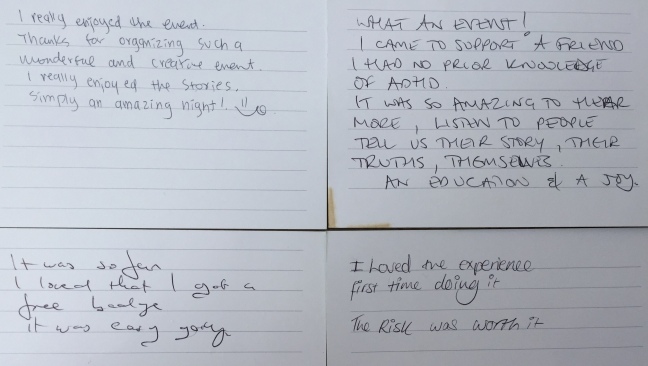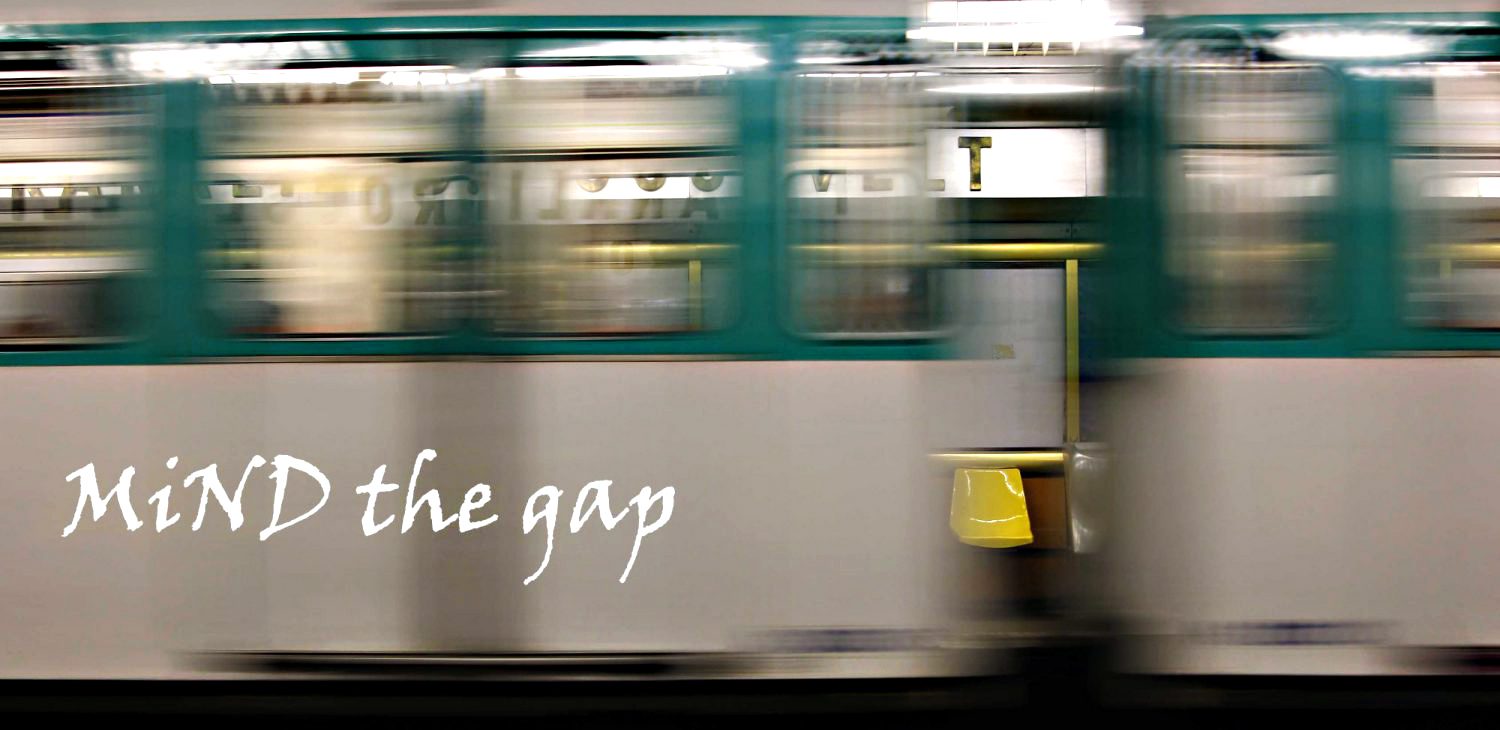Attention deficit hyperactivity disorder (ADHD) is popularly associated with being easily distracted. Its other features, such as out of the box thinking, hyperfocus or risk-taking seem to be less discussed beyond specialist contexts. Brisk/Risks was a fun, accessible and engaging open mic event exploring risk-taking within and beyond the framework of ADHD and mind wandering. It featured King’s College London’s Professor of Psychiatry Philip Asherson, ADDISS Chief Executive Founder and President of ADHD Europe Andrea Bilbow OBE, and Wellcome Trust-funded medical humanities scholar Dr Sophie Jones, amongst others, and was curated by artist Dr Kai Syng Tan. Brisk/Risks took place on 4 December 2018 at Bush House, London, UK. The event was part of the ‘King’s Artists – New Thinking, New Making’ exhibition, featuring Tan’s exhibition of a large tapestry from #MagicCarpet, which was her project mentored by Asherson (since 2017). The film version of the event (15 minutes) is BSL-interpreted and edited by Studio Maba. The film premiered at Birkbeck Arts Week 2019, which included an exploration by Tan of the contested term of ‘neurodiversity’. In this blog post, Kai shares 2 transcripts from the evening, of presentations by Kai and one of the participants, Jaye Braithwaite, a ‘Creative, Tourettist and Teaching Assistant’. Read Kai’s own reflections on the open-mic and film here.

TRANSCRIPT: Opening provocation by Tan
Do you take risks? Why? Why not? What’s the riskiest thing you’ve ever done? Do you regret it?
Are you risk-adverse? What could be the opposite of risk-seeking? Pragmatism? Common sense? Does survival come into play? Does courage or naivety come into play? Does play and pleasure come into play?
Flip side: Failure? Up-side: Resilience?
Risks and opportunities. Truths or dare. Live fast die young. Crime and Misdemeanours. Health and safety? Sense and sensibility? Cock and bull. A well-known university states: ‘risk-taking produces innovation. That’s why our classrooms are safe spaces for our students to take risks’. Yeah right. We call students ‘clients’ and promise them nothing less than a 2:1. How’s that for innovation?
Seeking novelty, cheap thrills or doing extreme sport because your ADHD brain is under-aroused. Stealing flapjacks from a shop everyday for four years because it gives you a kick — and you didn’t even like flapjacks. Sorry UCL. Having your film banned, tapes confiscated by the government because you’re not allowed to talk politics there. Upheavals: walking out of your family, country, relationships permanent jobs — as the norm, to work on this project for example.
If you have ADHD, your child has 25% chance of also having ADHD – congratulations.
Research commissioned by Eclipse, a black-led theatre company in Sheffield, reveals how when black artists are told that their work is ‘high risk’, it’s ‘simply an excuse for racism’.
Is humanity under threat from the rise of AI? Is democracy dead? — Do we care? Forests are burning. The earth is dying, ice is melting — and we’re put on our bikinis, sunbathing, basking in the heatwave. Heroes like Aung Sun Suu Kyi have fallen. Left standing, on centre-stage, at the far right, are jesters, cowards. Movement, a human right under Article 13 of the Universal Declaration of Human Rights, is endangered. Walls physical and invisible are erected, borders hardened, our minds closed, as we fear the other, retreat to our tribes hide behind screens. We stop taking risks, as artists, scientists, researchers, makers, citizens, and only go for tried and tested options. Work with or fund something/someone unfamiliar? Don’t be silly. We feel impotent, so we punch down, not up. We’re so busy fighting amongst ourselves, that we’ve become what Stephen Fry calls ‘illiberal liberals’ and ‘irrelevant and outdated bystanders’. The masses have shown that they can’t be trusted. So is now the time for a new profound theory, as Slavoj Žižek argues?
What if human beings didn’t go to the moon? What if, 2 million years ago, our ancestors didn’t run long distances — 6 hours, 30 kilometres, after the antelope –to hunt them down? Would the Homo erectus have died of starvation? What if migrants who risk everything to give their kids better lives give up and ‘go home’, as people around them keep telling them for centuries? What if entrepreneurs with ADHD like Richard Branson didn’t risk everything and start their businesses?
What if no one comes to my first ever – and possibly last — open mic? What if people come but no one comes up to speak? Will this spell the end of my career as an artist-curator?
It’s OK. I have a plan B. It’s our secret — that’s why I’m whispering. I’m coming up with my own brands of perfume. It’s targeted at people who think ADHD doesn’t exist. So when they use it, it makes them ‘a little bit more ADHD’: more restless, more reckless.
One is called Impulse. The other? Risk.
Would you buy it?

TRANSCRIPT: Presentation by Jaye Braithwaite
I shouldn’t be hiding
There’s no denying
That I’ve got Tourettes
I tic I shout I move all about
Let’s do adhd next
Absolutely
Disorganised
Happily
Daydreaming
I can’t keep still
I can’t concentrate
Easily distracted
I can’t wait
My mind races
The competition is real
I get that urge to tic …The thought, the feel
Sometimes it’s good
Sometimes it’s bad
Other times I’m happy
Other times I’m sad
The creativity I get
The way it hits me
I feel so free
Writing at 3am
Paper and pen
Ticcing at dawn
Sleeping at noon
It all just happened
Won’t be ending too soon
I’m unique
So unique
I like to think
Think think think
I’m unique
I’m special
Or am I just weird
I used to be angry
But I realised I was Just scared
Scared of people
And how they would react
It would cause me to act
Act normal or whatever that is
These weird things about me I hid
Hid them well
Until my head began to swell
I couldn’t take it anymore
It was time to pour
Show myself
Be proud
I’ve got adhd and Tourettes
And I’m allowed
Allowed to be myself
No filter
Just me
Now I can be
I can be finally free
—
LINKS
*See film trailer version of the film Brisk/Risks here.
*See gallery and feedback of Brisk/Risks here.
*See images and feedback of premiere of the film at Birkbeck, University of London, on 21 May 2019 here. The film premiere was part of Too Much/Not Enough: Neurodiversity and Cultural Production, of the Birkbeck Arts Festival, The evening featured 2 new provocations by Kai, alongside medical humanities scholar Dr Sophie A Jones and curator Alessandra Cianetti. Listen to podcast here and read the transcript of Kai’s response to the open mic/film, on risk-taking and leadership, here, and a provocation on the contested term ‘neurodiversity’ here.
* Find out more about #MagicCarpet here
* The Conversation article by Tan and Asherson: On the salience of high quality art in mental health
*BMJ medical humanities article: On thought-leadership of arts & philosophy inculture change (review of Mohammed Rashed’s book on mad activism)
*Disability Arts Online article: On neurodiversity & women
*PsychART article: On #ADHD women making #ADHD art
*A-N Artists’ Information article: On mind wandering: Best Friend/Worst enemy
*KCL Culture story: On being the first artist-in-residence, Social, Genetic & Developmental Psychiatry Centre
ABOUT #MAGICCARPET
The open mic and film are part of ‘We Sat On A Mat and Had a Chat and Made Maps! #MagicCarpet (from 2017), which is an art-science exploration which gathers diverse and divergent bodies (and bodies of knowledge) to explore difference and (neuro)diversity, with ADHD and how it relates to mind wandering as a starting point. #MagicCarpet was a 2017 Unlimited commission funded by Arts Council England, with additional support by King’s College London. Thus far, #MagicCarpet has reached more than 9000 people, including through Arts in Mind and Unlimited Festivals. Venues include Science Museum, Southbank Centre, South London Gallery, Art Workers’ Guild and the Peter Scott Gallery (Lancaster). Publications include an article that was read 2000 times within 2 days of publication in The Conversation (10.6 million readers) and a top 2018 editorial on neurodiversity and women in Disability Arts Online. 100% of the feedback for an event stated that the work has challenged their understanding of how the arts and science can collide and create new insights. AHRC reviewers have described a proposal of next phase of the work as ‘exciting and innovative’; ‘already leading the way’ and ‘with an impressive track record’. #MagicCarpet was awarded a prize for ‘Cultural Change’ by the National Coordinating Centre for Public Engagement (2018). Dr Kai Syng Tan FRSA SFHEA was the project’s lead and the first artist-in-residence at the Social, Genetic & Developmental Psychiatry Centre. An artist, consultant, curator and academic, Tan is best known for gathering diverse and divergent bodies and bodies of knowledge to engineer spaces of ‘productive antagonisms’ (Latham & Tan 2016) across disciplinary, geopolitical and cultural boundaries, in what she calls an interdisciplinary ‘ill-disciplined’ approach (Tan & Asherson 2018). Marked by an ‘eclectic style and cheeky attitude’ (Sydney Morning Herald 2006), ‘radical interdisciplinarity’ (Alan Latham 2016) and ‘positive atmosphere’ (Guardian 2014), she is recognised as ‘absolutely central’ for the emerging ‘Running Studies’, and was Visual & Communications Director for the £4m Opening and Closing Ceremonies of 8th ASEAN Para Games (2015).


